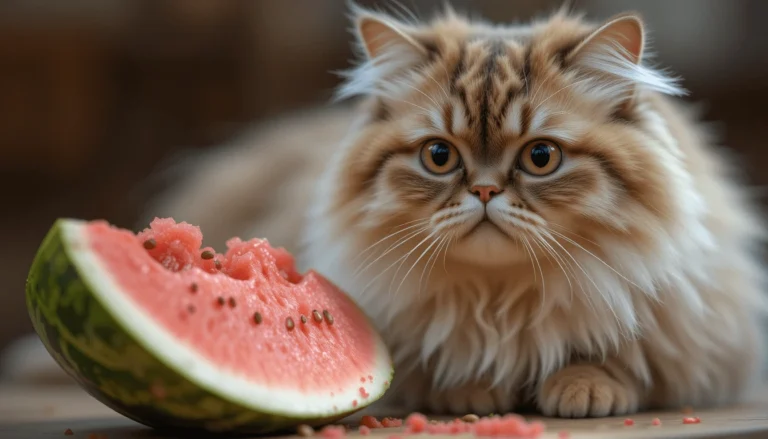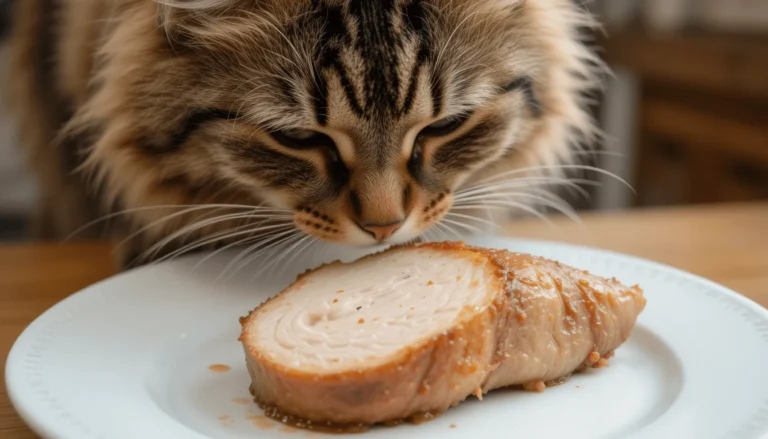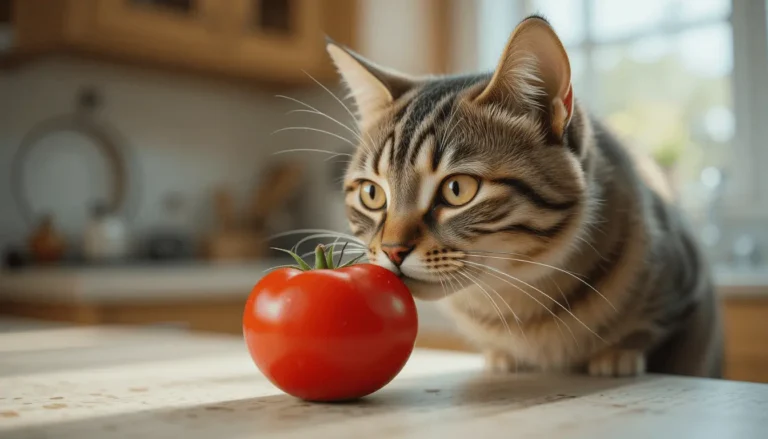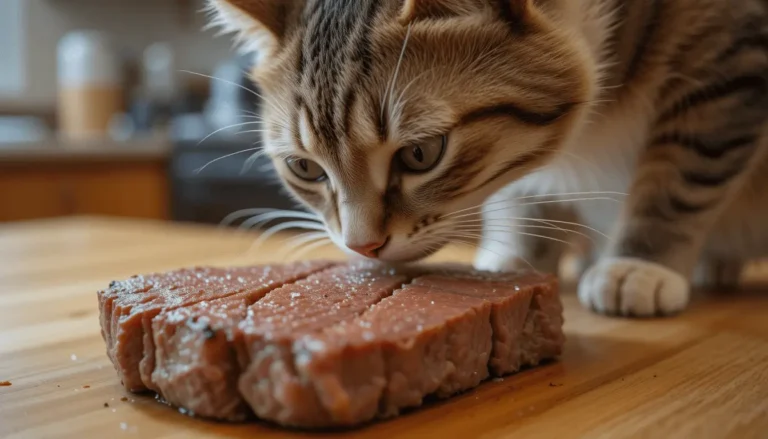Can cats eat blueberries ? Safety, Benefits, and Risks
Introduction
Picture this: You’re snacking on a bowl of fresh blueberries when suddenly—paws up! Your feline friend swipes one off the counter, batting it across the floor like a tiny, edible toy. As you rush to intervene, the question hits you: “Can cats eat blueberries… or did I just accidentally poison my pet?”
The truth? You’re not alone in wondering. As more pet parents explore natural treats for their cats, blueberries—packed with antioxidants and low in calories—seem like a healthy choice. But are they safe for our obligate carnivores? The answer isn’t a simple yes or no.
In this guide, we’ll dig into:
- The science behind cats and blueberries (spoiler: they can eat them… with caveats).
- Surprising benefits—like hydration support and fiber—that might make blueberries an occasional treat.
- Hidden risks, from sugar content to choking hazards, that demand moderation.
By the end, you’ll know exactly how (and if) to share this superfood with your whiskered sidekick. Let’s settle the debate once and for all!
Are Blueberries Safe for Cats? (The Straight Answer!)
Unlike chocolate or grapes, which are toxic to cats, blueberries are non-toxic and generally safe in small amounts. According to the ASPCA’s list of pet-safe foods, blueberries don’t pose a poisoning risk. However, that doesn’t mean they’re a natural part of a feline diet.

Can Cats Digest Blueberries? (The Carnivore Conundrum)
Cats are obligate carnivores, meaning their bodies are designed to thrive on meat—not fruits. While they can physically digest small amounts of blueberries (thanks to their short digestive tracts), they lack the enzymes to fully break down plant matter efficiently.
A study published in the Journal of Animal Physiology and Animal Nutrition found that cats derive less than 2% of their energy from carbohydrates—meaning blueberries offer minimal nutritional value to them.
Bottom line: Blueberries won’t harm your cat in moderation, but they’re not a dietary necessity.
Nutritional Value of Blueberries for Cats (A Tiny Superfood… for Humans)
While blueberries are packed with antioxidants, fiber, and vitamin C for humans, cats process these nutrients differently:
- Antioxidants (Anthocyanins): May offer mild immune support, but cats already get these from animal-based proteins.
- Fiber: A small amount (0.8g per 10 berries) could aid digestion, but too much causes diarrhea.
- Vitamin C: Unlike humans, cats produce their own vitamin C, so supplementation is unnecessary.
According to PetMD, the primary benefit is hydration—blueberries are 84% water, which can help cats who dislike drinking from bowls.
Potential Choking Hazards (Size Matters!)
While rare, whole blueberries could pose a choking risk for kittens or small cats. A 2020 report by the FDA noted that round, firm foods (like grapes or cherries) are more likely to cause obstructions in pets.
Pro Tip:
- Mash or cut blueberries into quarters for smaller cats.
- Supervise your cat the first time they try one.
Veterinarian Recommendations (Expert Advice)
Most vets agree: Blueberries are safe as an occasional treat. Dr. Sarah Wooten, a veterinary expert with PetCoach, suggests:
“1–2 blueberries, once or twice a week, is plenty. Any more could upset your cat’s stomach or add unnecessary sugar to their diet.”
Transition: Now that we’ve covered safety, let’s explore why some cat owners do feed blueberries—and when it might be beneficial.
Benefits of Blueberries for Cats (When Are They Helpful?)
Antioxidant Boost (A Small Shield for Immunity)
Blueberries are famous for their anthocyanins (the pigments that make them blue). A study in the Journal of Veterinary Science found that antioxidants can support cellular health in cats—but meat-based sources (like liver) are far more effective.
Fun Fact:
Wild cats occasionally eat berries in nature, likely for their water content, not nutrients.

Hydration Helper (Great for Picky Drinkers)
Since many cats struggle to drink enough water, the 84% water content in blueberries can be a sneaky hydration boost. A 2019 survey by Banfield Pet Hospital found that 34% of cats seen by vets showed signs of chronic dehydration.
Try This:
- Freeze mashed blueberries into ice cubes for a summer treat.
- Mix a blueberry puree into wet food (a trick recommended by The Spruce Pets).
Low-Calorie Treat Alternative (Better Than Processed Snacks)
At 4 calories per blueberry, they’re a smarter choice than many store-bought treats. For context:
- The average 10-lb cat needs 150–200 calories/day.
- Just 10 blueberries = 10% of their treat allowance (per AAFCO guidelines).
Comparison:
- Commercial cat treats: Often contain fillers like corn or soy.
- Blueberries: No additives, just natural sugars.
Fiber for Digestion (In Tiny Doses!)
A 2021 study in Frontiers in Veterinary Science noted that small amounts of fiber (like in blueberries) can aid cats with constipation. But beware—too much leads to loose stools.
Rule of Thumb:
- If your cat has digestive issues, consult your vet before using blueberries as a remedy.
Risks of Feeding Blueberries to Cats (What Every Owner Should Know)
While the answer to “can cats eat blueberries?” is yes, there are important risks to consider before sharing this fruity snack.
Sugar Content Concerns (A Sweet Danger)
Blueberries contain natural sugars—about 10g per cup. While this isn’t harmful in tiny amounts, regularly feeding too many can contribute to:
- Weight gain (obesity affects 60% of U.S. cats, per Association for Pet Obesity Prevention)
- Diabetes risk (cats are 3x more prone to diabetes than dogs, says Cornell Feline Health Center)
Vet Tip:
“Treats—including blueberries—should make up no more than 10% of your cat’s daily calories.” — Dr. Laura Robinson, Pawp veterinary advisor

Allergic Reactions (Rare But Possible)
Though uncommon, some cats may be allergic. Watch for:
- Itching or skin irritation
- Swollen face/paws
- Vomiting or diarrhea
A 2018 study in Veterinary Dermatology found food allergies affect ~1% of cats, with fish/beef being most common. Always introduce new foods slowly!
Gastrointestinal Upset (Tummy Troubles Ahead)
Cats’ digestive systems aren’t designed for plant matter. Overfeeding blueberries may cause:
- Diarrhea (from excess fiber)
- Constipation (if fed with skins/seeds in sensitive cats)
Pro Tip:
Start with 1/4 of a blueberry to test tolerance before offering more.
Toxic Foods to Avoid Mixing (Blueberry Safety ≠ Free-for-All)
While blueberries themselves are safe, NEVER pair them with:
Grapes/raisins (kidney failure risk)
Artificial sweeteners (xylitol is lethal)
Chocolate-covered berries (theobromine poisoning)
How to Safely Feed Blueberries to Your Cat (Expert-Approved Tips)
If you’ve decided to let your cat try blueberries after asking “can cats eat blueberries?”, follow these vet-recommended guidelines.
Proper Serving Size & Frequency (Less Is More!)
- Kittens: Avoid (stick to kitten-formulated foods)
- Adult cats: 1-2 berries max 2x/week
- Senior cats: Check with vet first (may need lower sugar)
Fun Fact:
A cat’s stomach is only the size of a ping pong ball (VCA Hospitals), so tiny portions matter!
Preparation Methods (From Fresh to Frozen)
Washed thoroughly (remove pesticides)
Mashed/pureed (for senior cats or toothless pets)
Frozen (great for teething kittens—supervise!)
Never canned or in syrup (added sugars are dangerous)
Monitoring Your Cat’s Reaction (The 24-Hour Rule)
After the first blueberry:
- Watch for vomiting/diarrhea (signs of intolerance)
- Check litter box for normal bowel movements
- Observe energy levels (lethargy = red flag)
When to Call the Vet:
If symptoms last >24 hours or include trouble breathing.
Tasty Alternatives (For Picky or Sensitive Cats)
If blueberries aren’t a hit, try these vet-approved snacks:
- Cooked chicken bits (pure protein)
- Cantaloupe cubes (high water content)
- Commercial freeze-dried treats (balanced nutrition)
Transition: Now you’re equipped with all the need-to-know info about cats and blueberries!
Conclusion: So, Can Cats Eat Blueberries? The Final Verdict
After digging into the science, consulting vet experts, and weighing the benefits vs. risks, here’s the bottom line:
Yes, cats can eat blueberries—but only as an occasional treat in tiny amounts. They’re non-toxic, hydrating, and low-calorie, but offer minimal nutritional value for obligate carnivores.
🚨 Key reminders:
- 1-2 blueberries, 1-2x/week max (any more risks sugar overload or tummy troubles).
- Always wash, cut, and supervise to prevent choking.
- Skip them entirely if your cat has diabetes, obesity, or a sensitive stomach.
For more on feline nutrition, check out these resources:
- Safe Or Not ? Cat Food Guide
- ASPCA’s Toxic & Safe Foods List
- Cornell Feline Health Center’s Dietary Guidelines
Final Thought: Every cat is unique—some may love batting blueberries around, while others will sniff and walk away. The real question is… what quirky food does YOUR cat enjoy? Share your stories in the comments! 😸🍇







